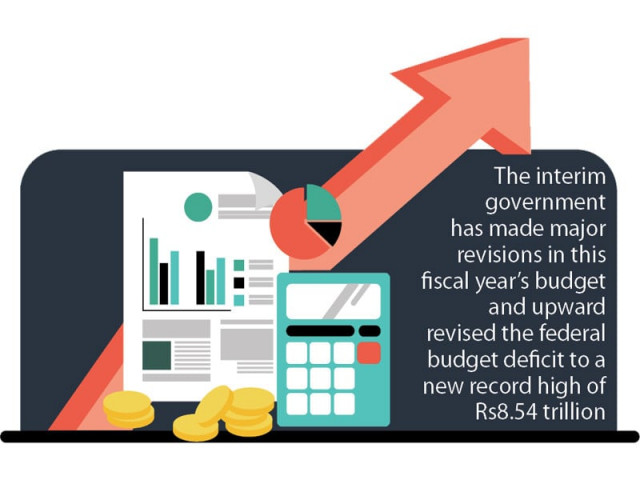Budget deficit increases to Rs8.54tr
Cuts external loan estimates by over $6 billion to $11.4 billion

The interim government has made major revisions to this fiscal year’s budget, significantly increasing the federal budget deficit to a new record high of Rs8.54 trillion but cutting the external loans estimates by over $6 billion due to the non-materialisation of Eurobonds and foreign commercial loans.
On Tuesday, the Ministry of Finance released its new Annual Borrowing Plan, detailing the revised estimates of Pakistan’s growing gross financing needs for bridging the budget deficit and debt repayments.
The new report reveals that, compared to the Rs7.5 trillion federal budget deficit target approved by the last National Assembly, the Ministry of Finance has projected a record Rs8.54 trillion deficit for fiscal year 2023-24. This revised estimate is Rs1.03 trillion or 14% higher than the budgeted target and is equal to 8% of the size of the economy—a level considered highly unsustainable and already burdened by debt.
The revision was necessitated solely due to earlier under-reporting of interest payments and unrealistic estimates of foreign debt-related inflows. The Express Tribune reported last September that the Ministry of Finance understated the interest cost by over Rs1 trillion and over-projected the disbursement of foreign loans by around $4.5 billion.
The report shows that, against the budget estimate of Rs7.3 trillion cost on account of interest payments, the revised allocation under this head is Rs8.33 trillion—a slippage of Rs1.03 trillion or 14%. The cost of domestic interest payments has increased from Rs6.4 trillion to Rs7.4 trillion. Similarly, the allocation for interest payments on external loans has also increased from Rs872 billion to Rs998 billion.
As a result of these revisions, if all other expenditures remain constant, the size of the federal budget has now jumped to a record Rs15.5 trillion compared to the Rs14.5 trillion outlay approved by the last National Assembly in June 2023.
Prepared by the Debt Management Office of the finance ministry, the new Annual Borrowing Plan lays down the borrowing strategy of the government to meet its gross financing needs (GFN). The report underlines that the government will continue to engage with domestic and international investors to improve coordination and information disclosure.
Had the government listened to the debt office in June last year, it would have avoided the latest revision on account of debt servicing costs.
The ministry further stated that interest expenses during the first half of this fiscal year amounted to Rs4.2 trillion, with 88% attributed to interest on domestic debt.
For the current fiscal year, Pakistan’s gross financing needs are estimated at a record Rs25.5 trillion or equal to 24% of the Gross Domestic Product (GDP), significantly higher than the sustainable financing level estimated at around 15% of GDP for a developing country like Pakistan.
Debt forecast
The Ministry of Finance has also revised its projections of borrowings from both domestic and external sources. The reliance on domestic sources has been increased substantially due to reluctance on the part of foreign lenders to provide new money due to poor credit ratings despite an International Monetary Fund umbrella.
The report shows that the government has cut its projections of gross foreign loans from Rs7.2 trillion to just Rs3.3 trillion—a reduction of 54% in rupee terms. There has been a corresponding increase in domestic loans—up from nearly Rs31 trillion to Rs34.2 trillion.
In dollar terms, the ministry has cut the foreign inflow projections from $17.7 billion to $11.4 billion—a downward adjustment of $6.3 billion, according to the new Annual Borrowing Plan. The revision has mainly been made on account of projections for Eurobonds and foreign commercial loans.
Read Budget deficit surges over 50%
The Ministry of Finance has dropped the plan to float $1.5 billion Eurobonds. It has also cut the estimates of receiving $4.5 billion foreign commercial loans to just around $2.5 billion. The report shows the projected inflows under the heads of both the commercial sources and “others” at $3.1 billion. This includes a $1 billion rollover of Chinese commercial loans maturing in June.
The finance ministry stated that external budgetary disbursements were recorded as $5.4 billion during the first half of this fiscal year. Compared to this, the external budgetary repayment during the first half of the fiscal year amounted to $3.3 billion, it added. In addition to this, China rolled over $1 billion in July last year and Saudi Arabia also extended $3 billion for one more year in December.
The Ministry of Finance stated that the government remained committed to completing actions associated with multilateral programme loans, which are in the pipeline and are projected to be disbursed during the second half of this fiscal year.
The government still hopes to receive $5.2 billion from multilateral creditors, which is largely in line with the original projections.
The ministry stated that Pakistan “stands committed to repay $1 billion Eurobond in April 2024”. It added that the issuance of new Eurobond-backed debt “will be considered once feasible”. It also expected bilateral deposits to be rolled over during the January-June period of this fiscal year.
A $2 billion Chinese debt is maturing on March 23rd and $2 billion in June (including $1 billion commercial).
The finance ministry stated that the government implemented a range of reform measures as part of the programme loans from the World Bank and the Asian Development Bank. These measures included the publication of the National Medium-Term Fiscal Framework and Goods and Services Tax harmonisation across federal and provincial jurisdictions.
It further stated that it also implemented the lenders’ conditions related to debt management, property valuation, and the energy sector, digitalisation of the payment system, improved tax administration, improved quality of public expenditures and cash management, the supply of credit for women, development of entrepreneurial capacity of women, and establishing strong institutional capacity for women in public and financial institutions.
The finance ministry stated that its borrowing operations remained smooth during the first half of this fiscal year. Due to expenditure rationalisation measures taken by the government, a federal primary surplus of Rs1.5 trillion was posted during the first half. However, the report showed that by the end of this fiscal year, this primary surplus would turn into a Rs202 billion primary deficit. It stated that in order to make debt management operations more competitive and improve transparency in borrowing operations as well as diversify the investors’ base, the government undertook amendments in the Treasury Bills Rules, 1998, and Ijara Sukuk Rules, 2008.
Pursuant to these amendments, the government carried out a maiden auction of one-year fixed-rate Ijara Sukuk at the stock market. It received healthy participation of Rs478 billion against a target of Rs30 billion.
Published in The Express Tribune, February 21st, 2024.
Like Business on Facebook, follow @TribuneBiz on Twitter to stay informed and join in the conversation.



















COMMENTS
Comments are moderated and generally will be posted if they are on-topic and not abusive.
For more information, please see our Comments FAQ